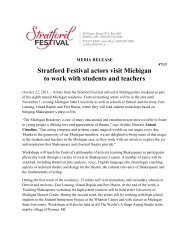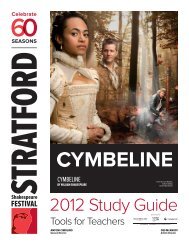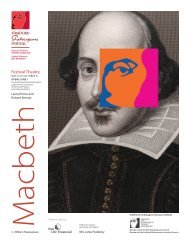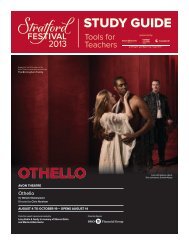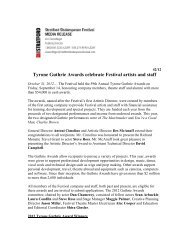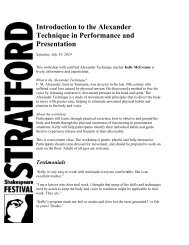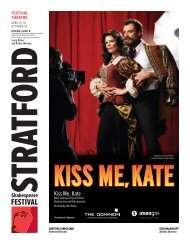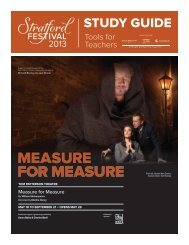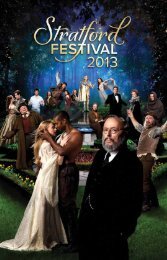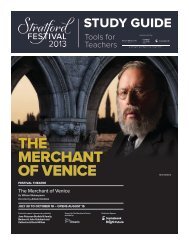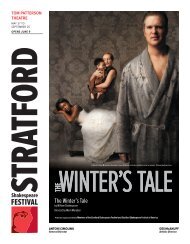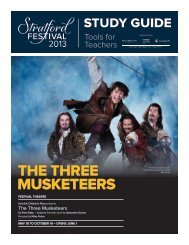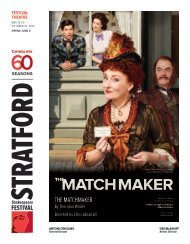RichaRd iii - Stratford Festival
RichaRd iii - Stratford Festival
RichaRd iii - Stratford Festival
Create successful ePaper yourself
Turn your PDF publications into a flip-book with our unique Google optimized e-Paper software.
4<br />
slips away from him. In the words of Alexander<br />
Leggatt, “Ironically, the role Richard has sought<br />
so long is the one role he cannot effectively play.”<br />
By the end of the play the central conflict is within<br />
Richard himself. Unable to sleep, visited by dreams<br />
and ghosts, his guilty conscience “hath a thousand<br />
several tongues,” and every tongue condemns him<br />
for a villain.<br />
Richard is not the only one with a guilty<br />
conscience. King Edward IV and the Duke of<br />
Clarence are also haunted by past deeds – by<br />
the thought that perhaps their ends did not justify<br />
their means after all. The play is full of dreams<br />
and prophecies, omens and ghosts, blessings<br />
and curses. As Queen Margaret’s prophecies<br />
come true, and the ghosts of the dead appear, it<br />
seems that England’s unfolding history is part of a<br />
providential plan. Richmond, who considers himself<br />
God’s “captain,” will rid the world of the usurping<br />
Richard. In doing so, he will return England to<br />
political and moral health: the winter of Plantagenet<br />
discontent will yield to the glorious summer of Tudor<br />
rule. At least that’s the Tudor version of the story.<br />
The play covers the historical events of 14 years,<br />
starting with Edward IV’s restoration in 1471 and<br />
ending with King Richard’s death in 1485. It is<br />
perhaps not coincidental that in the middle of the<br />
period presented, in 1476, the first printing press<br />
arrived in England. In the century between the<br />
historical events depicted and Shakespeare’s<br />
writing, the story of the villainous Richard III had<br />
spread through the Tudor chronicles, the first of<br />
which, by Polydore Vergil, was commissioned by<br />
Henry VII. Appearing in Richard III as Richmond,<br />
Henry VII was known in Shakespeare’s time both<br />
as the first Tudor monarch and as the grandfather<br />
of Queen Elizabeth I, who was on the throne<br />
when the play was written. Awkward questions<br />
regarding whether Richard III’s right to the throne<br />
was stronger than Richmond’s were put aside as<br />
chroniclers retold history in a form that generated<br />
patriotic pride.<br />
This play about political manipulations – about<br />
ends justifying means, as Machiavelli had written<br />
– was based on politically manipulated historical<br />
texts. Like the sources on which it is based,<br />
Shakespeare’s Richard III draws our attention<br />
to issues of representation and right rule at the<br />
intersection of medieval and early modern world views.<br />
Dr. Jane Freeman is a faculty member at the<br />
University of Toronto and a member of the <strong>Stratford</strong><br />
Shakespeare <strong>Festival</strong>’s Senate.



